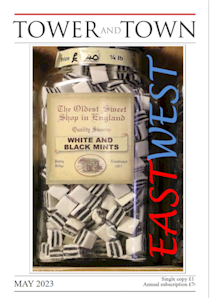

Tower and Town, May 2023 (view the full edition) (view the full edition)Wilfred Thesiger: Unity With Nature
"Then too, there's a solitude, and a freedom of these vast spaces. And to some of us, the irresistible attraction of nomad life: an unencumbered life where only essentials count, where one's pleasures, though very simple, very real: a long drink of clean water, the occasional luxury of meat, a few hours of sleep when the effort to remain awake becomes a torture, or a short linger over a small fire in the cold of the early dawn."(Arabian Sands 1959)Thesiger was born in Addis Ababa, (Ethiopia), and educated at Eton and Oxford. At the outbreak of WWII, he was assigned to the Sudan Defence forces, and subsequently served in Abyssinia, Syria, and with the S.A.S. in the Western Desert. His post-war travels, always on foot or with animal transport, included Arabia, Iraqi marshes, Kurdistan, Hindu Kush, Abyssinia, and Kenya. In addition, he was decorated with the military Distinguished Service Order, and was awarded for his travels and writing a CBE, several notable medals, and fellowship of the Royal Society of Literature.  Some of his prominent travels were those in the period 1945-1950 across the desert of the Empty Quarter in Southern Arabia, (Rub' al Khali); which is one thousand kilometres long and 500 kilometres wide. The terrain of this part of the Arabian Peninsula is covered in sand dunes, some up to 250 meters high; which he crossed twice with Bedouin companions and guides. Some of his prominent travels were those in the period 1945-1950 across the desert of the Empty Quarter in Southern Arabia, (Rub' al Khali); which is one thousand kilometres long and 500 kilometres wide. The terrain of this part of the Arabian Peninsula is covered in sand dunes, some up to 250 meters high; which he crossed twice with Bedouin companions and guides. In order to get ready he underwent a five-month probation at the fringes of the Empty Quarter in order to adapt himself to Bedouin ways and the rhythm of their life. The following excerpt from his text on "The Sands of Ghanim" reflects his observations from that period, confirming the attraction of nomadic life. In order to get ready he underwent a five-month probation at the fringes of the Empty Quarter in order to adapt himself to Bedouin ways and the rhythm of their life. The following excerpt from his text on "The Sands of Ghanim" reflects his observations from that period, confirming the attraction of nomadic life."My companions were always awake and moving about as soon as it was light. I think the cold prevented them from sleeping, except in snatches, for they had little to cover them other than the clothes they wore, and during these winter nights there was often ground frost. Still half asleep, I would hear them rousing the camels from their crouching places. The camels roared and gurgled as they were moved, and the Arabs shouted to each other in their harsh, far-carrying voices. The camels would shuffle past, their forelegs hobbled to prevent them straying, their breath white on the cold air. A boy would drive them towards the nearest bushes. Then someone would give the call to prayer. God is most great... I testify that there is no god but God... I testify that Muhammad is the Profit of God... Come to prayer! Come to salvation! Prayer is better than sleep. God is most great... There is no god but God.Each line except the last was repeated twice. The lingering music of the words, strangely compelling even to me who did not share their faith, hung over the silent camp." (Arabian Sands 1959)What Thesiger learnt from this journey did indeed slot well within his conservative Victorian mind-set - admiring the Bedouin for their incredible hard lives and intimate contact with the earth, a contact that we in the west had lost. There was nothing more in the world that he wanted than to become one of them, but that, of course, was a romantic dream. During his three years with the tribesmen, he discovered with some bitterness, that you can never unlearn what you know, never become what you are not. For all his genuine love and regard for the Bedouin, Thesiger was never able to abandon his place in civilization, never really to become one of them. Yet by travelling with them at the pace of the camel, dressing as they did, speaking their language, practising their customs, he found that one could, at least for a time, regain some of that sense of unity with nature which thousands of generations of human beings had known, but which ours had lost. Raik Jarjis |